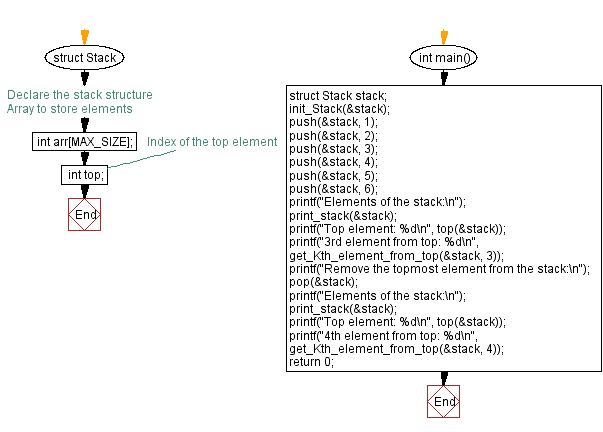C Exercises: Find the top and kth element of a stack
16. Kth Element Retrieval in Stack
Write a C program to implement a stack and accept some numeric values. Find the top and kth element of the stack.
Sample Solution:
C Code:
#include <stdio.h>
#include <stdlib.h>
#define MAX_SIZE 100
// Declare the stack structure
struct Stack {
int arr[MAX_SIZE]; // Array to store elements
int top; // Index of the top element
};
// Initialize the stack
void init_Stack(struct Stack *stack) {
stack->top = -1; // Initialize top index to -1
}
// Check if stack is empty
int isEmpty(struct Stack *stack) {
return (stack->top == -1); // Returns 1 if the stack is empty, 0 otherwise
}
// Check if stack is full
int isFull(struct Stack *stack) {
return (stack->top == MAX_SIZE - 1); // Returns 1 if the stack is full, 0 otherwise
}
// Push an element to the stack
void push(struct Stack *stack, int value) {
if (isFull(stack)) {
printf("Stack is underflow!\n"); // Display an error message if the stack is full
return;
}
stack->arr[++stack->top] = value; // Increment top index and add element
}
// Pop an element from the stack
int pop(struct Stack *stack) {
if (isEmpty(stack)) {
printf("Stack is empty!\n"); // Display an error message if the stack is empty
return -1;
}
return stack->arr[stack->top--]; // Return top element and decrement top index
}
// Get the top element of the stack
int top(struct Stack *stack) {
if (isEmpty(stack)) {
printf("Stack is empty\n"); // Display an error message if the stack is empty
return -1;
}
return stack->arr[stack->top]; // Return the top element of the stack
}
// Get the kth element from the top of the stack
int get_Kth_element_from_top(struct Stack *stack, int k) {
if (k < 1 || k > stack->top + 1) {
printf("Invalid value of k\n"); // Display an error message if k is out of range
return -1;
}
return stack->arr[stack->top - k + 1]; // Return the kth element from the top of the stack
}
// Function to print the elements of the stack
void print_stack(struct Stack* s) {
if (isEmpty(s)) {
printf("Stack is empty\n"); // Display a message if the stack is empty
return;
}
for (int i = 0; i <= s->top; i++) {
printf("%d ", s->arr[i]); // Print each element of the stack
}
printf("\n");
}
// Main function
int main() {
struct Stack stack;
init_Stack(&stack); // Initialize the stack
// Push elements onto the stack
push(&stack, 1);
push(&stack, 2);
push(&stack, 3);
push(&stack, 4);
push(&stack, 5);
push(&stack, 6);
printf("Elements of the stack:\n");
print_stack(&stack); // Print the elements of the stack
printf("Top element: %d\n", top(&stack)); // Print the top element of the stack
printf("3rd element from top: %d\n", get_Kth_element_from_top(&stack, 3)); // Print the 3rd element from the top
printf("Remove the topmost element from the stack:\n");
pop(&stack); // Remove the top element from the stack
printf("Elements of the stack:\n");
print_stack(&stack); // Print the elements of the stack after pop operation
printf("Top element: %d\n", top(&stack)); // Print the top element of the stack
printf("4th element from top: %d\n", get_Kth_element_from_top(&stack, 4)); // Print the 4th element from the top
return 0;
}
Output:
Elements of the stack: 1 2 3 4 5 6 Top element: 6 3rd element from top: 4 Remove the topmost element from the stack: Elements of the stack: 1 2 3 4 5 Top element: 5 4th element from top: 2
Flowchart:



For more Practice: Solve these Related Problems:
- Write a C program to find the kth largest element in a stack without using sorting algorithms.
- Write a C program to retrieve both the kth element from the top and the kth element from the bottom of the stack.
- Write a C program to display the current top and kth element after every push or pop operation in a stack.
- Write a C program to swap the kth element from the top with the kth element from the bottom in a stack.
Go to:
PREV : Remove Minimum Element Variants.
NEXT : Base Conversion Using Stack.
C Programming Code Editor:
Have another way to solve this solution? Contribute your code (and comments) through Disqus.
What is the difficulty level of this exercise?
Test your Programming skills with w3resource's quiz.
